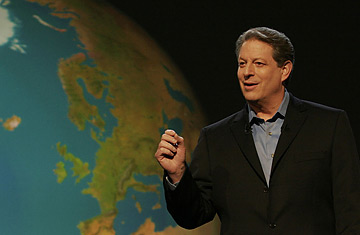
Al Gore appears in the film An Inconvenient Truth
Data discrepancies are fascinating. I was researching the topic of global warming and happened upon the results of a survey conducted in July by Yale University's School of Forestry & Environmental Studies addressing American opinions of global warming. According to the press release issued by the school, "Americans consider global warming an urgent threat." I didn't pause very long before diving quickly into our data to see if this urgent threat was reflected in the way we search. If, as the study claimed, "nearly half of Americans believe that global warming is either already having dangerous impacts on people around the world or will in the next 10 years," we have a funny way of showing it.
What we say (in surveys) and how we act (in this case, by searching on the Internet) show a very different story. Interest in global warming spiked at the beginning of this year, rising to three times its normal level on Feb. 1, 2007, coinciding with Al Gore's Nobel Peace Prize nomination. But since then, the volume of searches on "global warming" have dropped off precipitously to the lowest levels in the last year save for a brief recovery in advance of the actual award of the Nobel Peace Prize to Gore last week.
404 Not Found
How we search for global warming is even more telling. In the last four weeks, Hitwise captured 1,427 different searches that contained the phrase "global warming." By analyzing the top 100 searches, it's clear that Internet users continue in their quest to understand what global warming is. In fact 92 of the top 100 terms were general or educational in nature, with the top terms including: "global warming," "about global warming," "al gore global warming," and "articles on global warming." Of the top 100 terms only four terms gave a sense of positive action: "global warming prevention," "how to prevent global warming," "ways to prevent global warming," and "global warming solutions." The other four terms rounding out the top hundred included the skeptical queries such as "global warming myth," "global warming hoax," "benefits of global warming," and searches for the skeptic's video answer to An Inconvenient Truth: "the great global warming swindle."
Another interesting measure of global warming interest is where Internet users go when they're looking for information on the topic of global warming. Over 19% of searches on the term resulted in visits to Globalwarming.org, a site sponsored by the conservative Competitive Enterprise Institute, while 14% of global warming searches resulted in visits to Wikipedia.org, reinforcing the notion that we're still in the phase of learning more about the issue.
The most surprising fact is the absence of global warming discussion in the political category. According to the same Yale study, "a surprising 40% of respondents say a presidential candidate's position on global warming will be either extremely important (16%) or very important (24%) when casting their ballots." Over the last four weeks there were over 21,000 search terms sending traffic to the politics category. Political issues continue to play an integral role in search with terms such as "jena 6," "abortion," "death penalty," and "Iraq casualties" all appearing in the top 20 terms. The first global warming term appears in the 477th position, "global warming myth."
One question in the Yale poll may explain the discrepancy in the data, when asked "which comes closer to your own view — most scientists think global warming is happening, most scientists think global warming is not happening, or there is a lot of disagreement among scientists about whether or not global warming is happening, or do you not know enough to say," 48% said "it's happening," while 40% commented that there is "a lot of disagreement." Search term data reflects that. It's clear from Internet queries that we're confused, don't know what to think and that we're using search engines and websites to move up the global warming learning curve.
Bill Tancer is general manager of global research at Hitwise.
